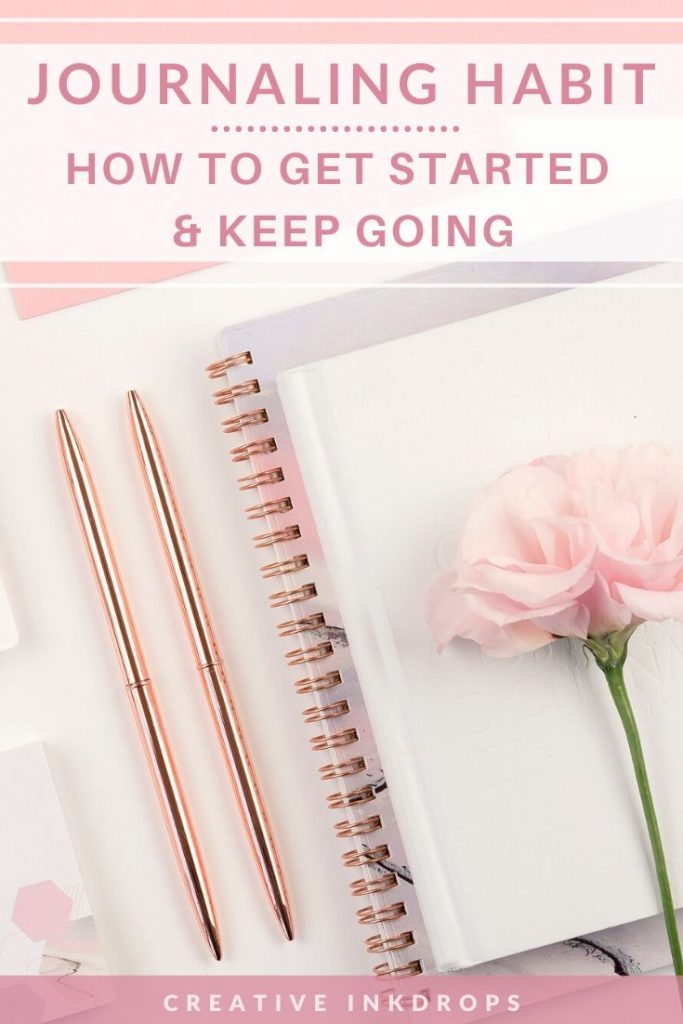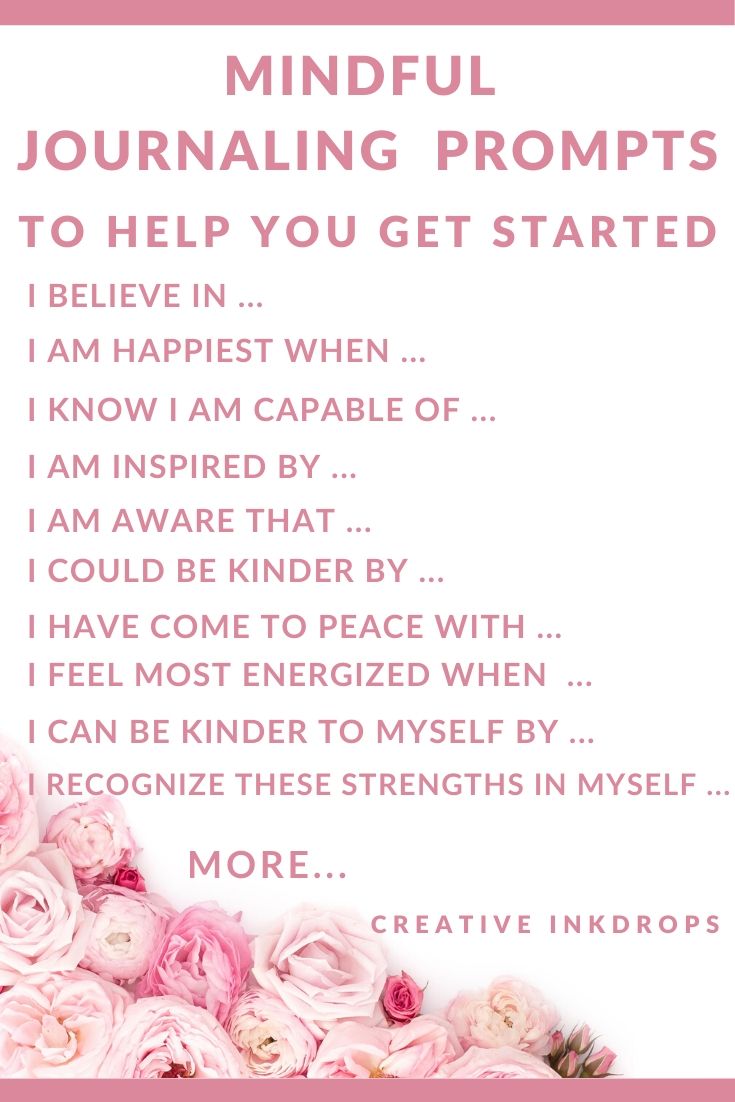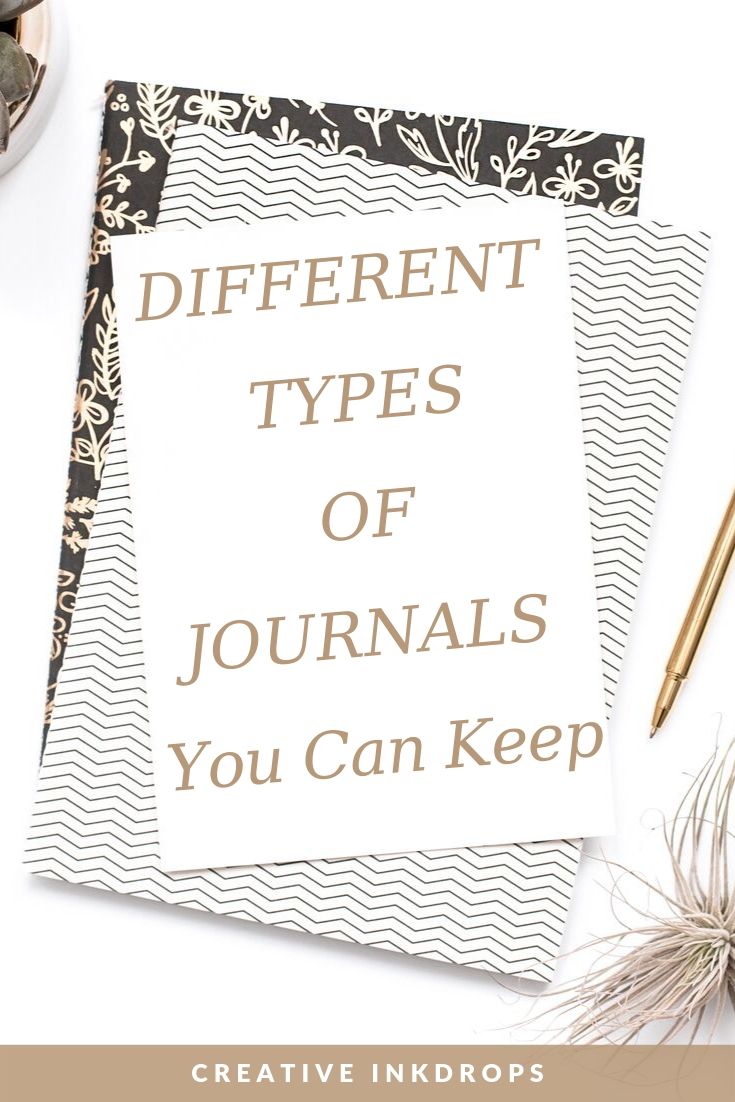Journaling Habit – How To Get Started & Keep Going
 Is it worth making journaling a habit?
Is it worth making journaling a habit?
It’s a question you may ask yourself as you ponder over the idea of a journaling habit.
Most people think about journaling as a way to find some clarity when they are struggling with something or when they want to reach a goal. While it is certainly a great tool for mental and physical wellness, a daily journaling habit can provide a lot of other benefits for you.
It is really easy to get started with journaling. It doesn’t require a big investment and there are no rigid rules or requirements. Besides, with so many different types of journaling and forms of writing, there is definitely something for everyone.
Check out the different types of journaling and think about which style best suits your personality. Choosing a style you enjoy will make it easier to start and keep going with your journaling habit.
Let’s talk about journaling as a habit, and how to stay motivated to do it every day.
1 – Discover Your Why
Before you can turn journaling into a daily habit, you need to understand why you are doing it. This goes for just about anything in your life. If you’re trying to eat healthier, you typically know why – whether that is to lose weight, lower your cholesterol and blood pressure, have more energy, or feel more energetic.
The same can be said for healthy habits like writing in a journal. If you don’t know why you’re doing it and the benefits that you will enjoy from making journaling a habit, you are less likely to be motivated to keep going.
Common Reasons to Journal Daily
Why should you start a journaling habit? You probably know a lot of the benefits already, but here are some of the top ones that can help guide you in the right direction:
- It Lowers Your Stress Levels – Stress relief is the main reason why many people start writing in a journal every day. If you are feeling overwhelmed by all that’s going on in your life, and your work or home environment has become stressful, the journal becomes your way to de-stress and relax. It also helps with other mental health issues, including anxiety and depression.
- It Helps to Find Clarity – You can also gain more clarity into what motivates you, what are your goals, why your goals aren’t being met, and where your emotions are coming from. There are many different types of journals, but when it is more of a daily journal or stream of consciousness journal, that is when you get honest with yourself and discover more than you ever knew.
- It is Great for Tracking Health and Other Habits – If you are trying to lose weight, figure out your allergy triggers, or discover why you keep getting panic attacks, then journaling is a wonderful tool for you. You can keep track of these events and look for patterns as to what is making you ill or keeping you from certain health goals.
Why Do You Want to Journal?
Now that you know some of the common health benefits of journaling, you can start thinking about your own motivations and reasons for journaling. This might be different from why someone else wants to write in a journal, so it helps to really think this through. You know what would help? Writing In Your Journal!
Buy a new journal and keep the first page just for working out WHY you are starting your journal habit and WHAT you intend to accomplish by it. That way, every time you open your journal, you can look at that first page and hold onto that motivation.
2 – Choosing What to Write About
Once you have your own personal reasons for wanting to write in a journal, the next part of turning it into a regular habit is choosing what you want to write about.
This is also more of a personal decision. The reason you want to choose your own motivations and inspirations is not only because it helps you hold onto this habit, but it also allows you to benefit the most from journaling itself.
If you keep reading about how journaling has helped others with their anxiety attacks, but you don’t get them, that isn’t really helpful to you.
Different Types of Journaling
There are many different forms of journaling, often some that you haven’t even thought of yet. Knowing what they are is really helpful if you are getting stuck with what you want to write about. These include:
Daily Journaling – Daily journaling is the more traditional form of journaling, where you write in your journal every day, but don’t really have one sole focus. You might set a timer and do stream of consciousness, writing about whatever pops into your head. Or you may have a goal of filling up one page every day or just write in your book in the morning when planning out your day. There is a lot of flexibility with this type of journal.
Gratitude Journal – For a more focused form of journaling, you can try a gratitude journal. With a gratitude journal, you are writing down what you are grateful for each day. This helps many people with stress or mental health issues, as they are able to look beyond those stressful days and still appreciate the good things in their life. This can be in your traditional journal or a separate journal all on its own.
Art/Coloring Journal – Are you a creative person? Perhaps this is the type of journal you want to have. Journaling doesn’t have to be just writing. You can mix up writing and creating in your journal. Get out your art supplies and color pages within your journal, whether it is a coloring page you created or just sketches to express your emotions next to words.
Bullet Journal – If you want to get some of the benefits from journaling without a lot of writing, and are looking to organize your life a little better, then a bullet journal is perfect for you. This is a lot more complex, but it is great for people who want a more organized, structured, and planned life to relieve stress and start brand new healthy habits.
Consider Your WHY
Another way to figure out what style of writing you want to go with is to look back on the reasons why you are writing in a journal in the first place.
What did you decide in the first step?
Are you looking for more self-awareness?
Do you want to figure out why you keep binge eating?
Are you dealing with work or personal relationship problems?
All of this matters when it comes to journaling. It not only gives you motivation to benefit from journaling, but it shows you what you might want to write about.
What do You Want to Get Out of it?
Finally, think more about what you want to get out of it. This also goes along with why you’re choosing to journal, and why you want this to be a daily habit. Are you hoping to be more confident? Have a healthier lifestyle? Come to terms with something that has happened to you?
These simple questions often make a big difference and turn journaling into something you want to do someday, to something you want to do now.
3 – Set Up Your Journaling Environment
Now the fun part begins – getting ready to turn journaling into a habit! Naturally, that begins with having a good place and setup for journaling. It is so much easier to be motivated to journal every day and turn it into a lifelong habit when you are happy with where you’re writing.
If you have ever tried to do homework at home, you know the difference between attempting it in the living room on the couch with your family, and working in your bedroom at a desk with the door closed. The change is insurmountable.
Setting up your perfect journaling environment requires two main things: selecting what to journal with and where to do the writing.
Find Your Favorite Journaling Supplies
This really does have a large impact on whether you journal a few times and give it up, or if you are able to turn it into a habit. You want journaling to be enjoyable, not feel like homework or a chore. The best way to start doing this is to find supplies you really LOVE to use.
Sure, you can start with anything you have at home, but at a certain point, it is good to go shopping and buy a journal that you absolutely fall in love with.
Start with the journal itself. There are so many different types of journals and notebooks you can use, that it would be impossible to name them all. There are hardbound journals and softbound books specifically meant for journaling, or you might prefer something with bigger pages, more similar to a notebook. You may like diaries because come with a lock and key.
There are no rules here – use what you love, whether it is the size, appearance, color, lines or unlined pages. Keep looking around until you think YES! This is the one!
Buy the supplies. Next up are the journaling supplies, including what you are going to write with. Everyone has a preference as to the type of writing tool they use, so if you already have something you love, by all means, stock up! Otherwise, start experimenting. Buy pens and pencils of different varieties and write a few sentences with each one.
You will find that there is a lot to each style of pen. Some are more comfortable to hold in your hand, others bleed and will drive you nuts. Some people prefer thinner points, others like a thicker point. Some like to write in pencils, others prefer pens. Again – no rules!
Set Up a Journaling Haven
Part two of creating a good journaling environment is to set up the area where you intend on journaling. A lot of times, the success of your journaling habit is indicative of your environment. If you keep trying to write at the kitchen table while your kids are eating and demanding attention, you’re probably not doing too well.
This is a mistake. You need a place just for you that is quiet and free of distractions. Here are some tips for setting up a journaling haven in your home.
Find the Quietest Place in Your Home – You probably already have a place in mind. It is somewhere you can go to that feels more secluded and comfortable. Definitely choose a place where there are fewer distractions. The ideal place could just be while you are sitting on your bed before your family wakes up, or going to your home office.
You may have a little reading nook in the family room that you can use for journaling. Think of your day-to-day life and choose where you might get at least 15-20 minutes of uninterrupted quiet time every day.
Create a New Spot if Needed – Sometimes, your home isn’t really set up to have the perfect journaling spot, so you need to be creative and actually create a spot. Do you have a corner of your bedroom with just a tall plant, and no other furniture? This might be perfect for you! Move the plant somewhere else and see if a little desk and chair might fit there.
Maybe your formal dining room isn’t used often, so you rearrange things and have a little journaling space set up there, or you transform your outdoor shed into a journaling and crafting room just for you.
Think Outside the Box (or home) – Not everyone can find those few minutes every day in their home to really focus on journaling. That’s okay! Take it outside the home in this case. Think about journaling in the car while waiting for your kids to get out school, or when you arrive to college a few minutes early. If you have an office or cubicle with some quiet time during your lunch break, you can journal there as well.
Have Everything Ready to go – While you can definitely bring your journal everywhere with you, especially if you have a busy schedule, try to have your main journaling area set up already. Have your journal, writing utensils, and other accessories like an essential oil diffuser, desk lamp, and candle all ready to go. This makes it a lot easier to just sit down and get your journaling done.
4 – Decide When You Want to Journal
You likely know what’s next – now that you have your journaling space set up, you will need to choose when to journal. This is another vital part of turning journaling into a habit, as opposed to just doing it whenever you find it most convenient.
Think of journaling like exercise. You know it’s good for you. You know you should do it every day for your physical and mental health. But, do you only do it when the mood strikes you, or do you find it easier to schedule it in and stick to that schedule?
If you’re being honest with yourself, the latter is probably a little more realistic.
Journaling doesn’t need to feel like a chore, but by choosing a general time for journaling each day, it soon becomes a habit. Then you just do it automatically, and it is part of your daily routine. Something you not only know to do, but you actually look forward to.
Choosing Your Magical Journaling Hour
You might already have an idea in mind about when you would like to write in your journal, but if not, here are some more tips.
When will you have quiet time alone? If you are able to focus on your writing with noise in the background, that’s great! Unfortunately, many people need more quiet time. Your best writing hour may be the time of day when the house is quiet, whether that means getting up a little early before the rest of your family, or bringing your journal to the office and closing the door.
When do you feel most creative? Are you someone that has a certain time of day when you tend to be more creative or enjoy writing more? Think about when you typically feel like working on craft projects at home or when you enjoy trying something new. This might be the key to when journaling would also be the most effective for you.
Is there a time of day when reflecting is most beneficial? Another thing to consider is when you want to self-reflect. A big part of journaling is that it helps you find clarity and become more self-aware. If you are so tired in the morning, that you don’t believe you can really find that self-reflection properly, you should probably try to journal later in the day instead.
Is your main goal to set up your day in a positive way? On the other hand, if you want journaling to help you with setting goals and providing a positive mindset for your day, then starting in the morning is going to be perfect.
5 – Find Your Motivation
As you probably know if you have ever tried to develop other types of healthy lifestyle habits, it not only takes the prep work, but you need to keep up with your motivation. This is motivation to begin and to keep going and doing it every day.
Where can you get journaling motivation from? You have already learned a few methods, including:
Figuring out why you want to journal
Considering the many benefits of journaling
Allowing yourself this free, quiet time to self-reflect
This is a great start, but it might not be enough to turn journaling into a true habit. Here are a few methods we recommend:
Use Journaling Prompts
If you ever get stuck on what to write, don’t let it break you of the journaling habit! You can use journaling prompts in this case. This can be anything from answering a question-style prompt to just being given a topic of what to write about. There are hundreds, perhaps thousands, of journaling prompts already available. But here are some to help get you started:
What made you want to start a journal?
What is your happiest childhood memory?
What are you next 90-day goals?
Do you have a bucket list? List everything on it.
Are you happy in your life right now?
Make Journaling Fun
Don’t feel like journaling is a chore! If it feels that way, it is time to change your environment or your entire mindset around the activity. Turn on some fun music, use colored pencils and art supplies in your journal, or get embellishments for it. Set up your journaling area to be bright and colorful, or whatever will make you happy and feel like this is a treat you are giving yourself.
Involve Your Family
Yes, journaling is mostly going to be a quiet, private activity just for you, but there are still ways to involve family or friends. One way is to get everyone in your family a journal of their own, such as a different color of the same type of journal for each person. That way, each person in your family can feel like they are also participating.
You can also have “journaling parties” where you get a group of friends together to write in your journals, then reflect out loud anything you don’t mind sharing. It is another version of a book club that can be a lot of fun, and you often get great ideas from others.
6 – Keep it Personal and Private
The last important thing to remember when you are trying to turn journaling into a habit is that you need to keep your journal personal and private. This is essential because it allows you to be completely open and honest with yourself while you write.
Did you ever have a diary as a kid with a lock and key? You probably wrote all your thoughts and feelings in it. You felt confident in doing so because it could not be opened without that key.
That is how you should think of your journal. Keep is somewhere private and make sure nobody has access to it. This is your personal property, and if you feel like someone might read it, your writing will be vastly different.
A Final Thought on Starting a Journaling Habit
Journaling is not a miracle cure or a quick fix, but it provides so many benefits, there aren’t many reasons not to do it. It is easy to start, something everyone can do regardless of their budget, and can be done just about anywhere.
Pick up a journal and just start writing every day, then see what happens. You might be pleasantly surprised by the positive impact it has had on your life.




